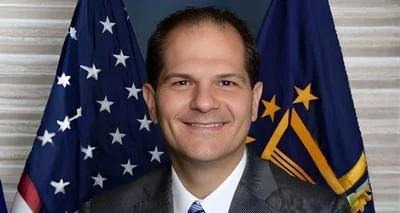Denise Barreto | Facebook / Evanston Present and Future
Denise Barreto | Facebook / Evanston Present and Future
Denise Barreto is the Chicago Transit Authority’s first Chief Equity Officer.
In an interview with WBBM News Radio's political editor, Craig Dellimore, Barreto discussed her journey from corporate America to public service, emphasizing her frustration with the lack of promotion in the corporate sector.
“I was on my way to being someone's CEO or someone's CMO. That's the way I was going. I was not – I was a business major, I was in communications,” Barreto told WBBM.

CTA train
| Wikimedia Commons / JeremyA
“Like, I wasn't trying to be in equity, but let's be real – corporate America didn't know what to do with this energy, and it abused this energy and it didn't promote this energy in the way that it should have. And I ended up turning this energy to public office as a hobby.”
“Because I couldn't get all of this, you know, energy fulfilled in the work that I was doing and that – I'm not giving them plug at all – back when I was in my corporate days.”
Prior to her time as government employee Barreto was a consultant on equity issues.
“This was before those young women of color, childbearing age, you know, all the squads you see today,” she told WBBM.
“It was me and Stacey Abrams (who) were doing that small pockets and nobody was talking about it and nobody was investing in us. I did not want to do this work. But you know what? I got called into it because of what my skills are, my skills and my tenacity.”
Barreto previously served as a trustee for the Village of Lake in the Hills for six years, an experience she credits with enhancing her ability to lobby lawmakers on equity issues.
“I'm telling these people you are going to be judged right in 20 years from now from the decisions that you make today,” Barreto told WBBM.
“And I can say that because I've been elected before, a lot of times when you're talking to these folks, they're like, ‘well, you’ve never have your your name on a ballot.’ I have twice in McHenry County, right – that wasn't very friendly to people that look like me.”
WBBM promoted the interview via its Twitter account.
Barreto was named CTA's Chief Equity Officer in July. Prior to that she was the Director of Equity and Inclusion for Cook County under County Board President Toni Preckwinkle.
Barreto played a pivotal role in a 2021 initiative mandating “racial equity and cultural competency training” for all Cook County employees by 2022.
During Barreto's tenure, Cook County allocated $100 million to its "Equity Fund," with a substantial portion directed towards minority- and women-owned businesses.
In 2019 alone, the county reported spending $74 million with such contractors, including $25 million with Black-owned businesses, $18 million with Hispanic-owned businesses, $15 million with Asian-owned businesses and $14 million with women-owned businesses.
Barreto emphasized the significance of redirecting funds to minorities.
“Money we would be spending, we’re spending on folks who need it most, connecting them to our systems. The idea is, that gives them a chance to be seen by other entities. Because that’s half the battle with minority businesses — people giving you a chance. You can’t do racial equity without betting on somebody you don’t know,” Barreto told the Chicago Sun-Times.
In that role, Barreto also developed a “racial equity assessment tool.”
On LinkedIn Barreto noted her resignation from the Lake in the Hills Village Board.
“I resigned my position with a move to Evanston, IL in August 2015 to pursue greater diversity for my family as well as expand my business which has greater impact and influence on local policy across the region specifically Northern Cook, Kane, DuPage, Lake and Winnebago Counties versus my elected position and staying McHenry County,” her LinkedIn account reads.
Barreto calls herself an “Intersectional Justice Maven” on LinkedIn.
According to the Heritage Foundation, "intersectionality" is a Critical Race Theory concept “that allows someone to claim victimhood based on his or her identification with more than one group.”
Many critics argue that intersectionality, particularly in relation to the creation of DEI positions such as that held by Barreto, leads to a misconception about bigotry in modern day America.
“Critical race theory and intersectionality—formerly confined to graduate seminars—have seeped into corporate America and Silicon Valley, as well as into many K–12 education systems,” Eric Kaufmann wrote for the Manhattan Institute in 2021.
“With their spread has come an increase in the misperception that bigotry is everywhere, even as the data tell a different story: racism exists, but there has never been less racism than there is now.”






 Alerts Sign-up
Alerts Sign-up